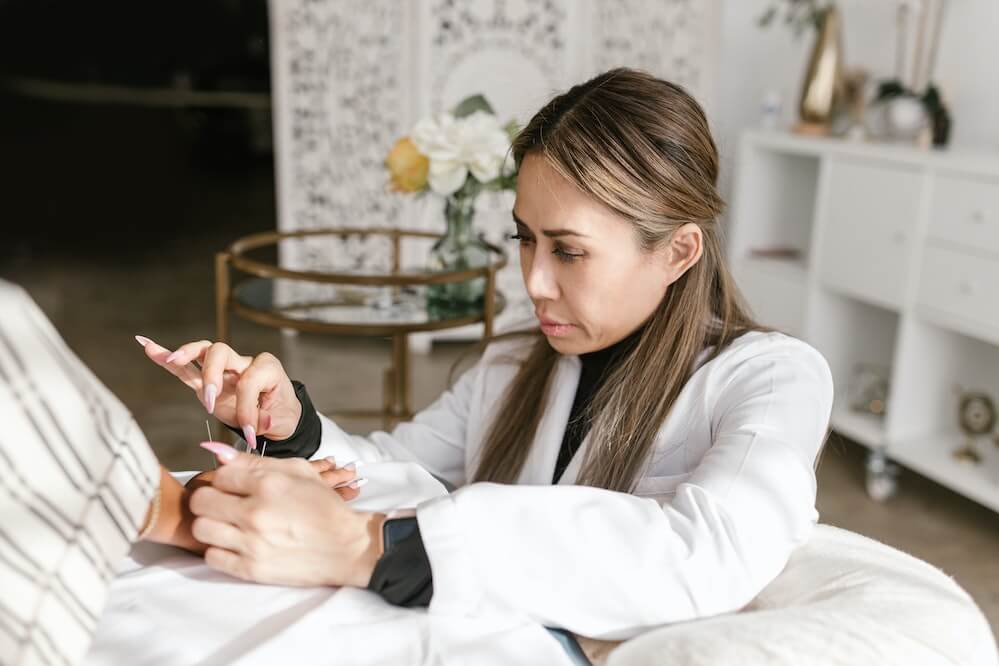The road to wellness is paved with choices, and one of the most significant ones lies in picking the right professional to guide you along the way. If you’ve found yourself pondering over what makes a good acupuncturist, this comprehensive guide is for you.
By delving into the defining characteristics, critical skills, ethical standards, and empathetic qualities that shape a superior acupuncturist, this guide will provide you with the insight necessary to make an informed decision. So, embark with us on this journey of discovery and find out what features to look for when choosing an acupuncturist.
Understanding Acupuncture
Acupuncture is an ancient practice that usually involves penetrating the skin with thin needles to stimulate the body’s natural healing abilities and improve overall well-being. Occasionally, other forms of stimulation are preferred over needles, such as:
-Heat (moxibustion)
-Pressure (acupressure)
-Friction
-Suction (cupping)
-Impulses of electromagnetic energy
According to traditional Chinese medicine, there are hundreds of acupuncture points (acupoints) in the body along 14 major meridians (energy-carrying channels). By activating specific acupoints, the needles stimulate the central nervous system and immune system and help rebalance the body, release endorphins, and react to an illness or symptom.
Acupuncture can be an effective treatment for many conditions and symptoms, such as:
-Myofascial pain
-Fibromyalgia
-Menstrual cramps
-Addiction
-Dental pain after surgery
-Nausea
-Tennis elbow
-Asthma
-Low back pain
-Osteoarthritis
5 Characteristics of a Good Acupuncturist

Understanding the characteristics of a good acupuncturist forms the bedrock of your journey toward improved health and well-being. There are several key traits that set apart the competent acupuncturist from the crowd. We will delve into each of these traits in detail, shedding light on their importance and how they shape the experience of an acupuncturist’s patients. Equip yourself with this knowledge to ensure that your acupuncturist is not only technically proficient but also holistically attuned to your well-being.
Extensive knowledge and education
Acupuncturists receive rigorous training and knowledge in acupuncture techniques, biology, medicine and dentistry, psychology, patient care, pain management, Traditional Chinese Medicine, etc. A good acupuncturist will be able to utilize the knowledge they gained during their training to ensure their patients receive a unique treatment to their needs.
Licensing and certification
When selecting an acupuncturist, it is vital to ensure they possess the necessary licensing and certification. This assures you that they have met the minimum professional and educational standards required by the state or regulatory body.
Licensing is typically granted by a state licensing board and requires the acupuncturist to have completed an acupuncture program from an accredited acupuncture or Oriental Medicine school. In the United States, most states require acupuncturists to pass the exams administered by the National Certification Commission for Acupuncture and Oriental Medicine (NCCAOM).
On top of licensing, a good acupuncturist might also have additional certifications in specific areas of practice, such as pain management, sports medicine, or geriatric care. These certifications often require additional coursework, examinations, and supervised clinical experience.
Excellent communication skills
Strong communication skills are crucial for a good acupuncturist. They help them create a strong bond with patients to ensure they feel understood and comfortable.
Firstly, an acupuncturist needs to be a good listener. By paying close attention to what patients are saying, they can understand their problems better and provide the right treatment.
Next, asking questions is important. By knowing more about a patient’s daily life and general health, an acupuncturist can get a clearer picture of the patient’s overall well-being. This can help guide their treatment approach.
Being able to answer patients’ questions clearly and patiently is also crucial. This ensures that patients know what to expect and helps build trust between the acupuncturist and the patient.
Lastly, an acupuncturist should be honest about how long it might take to see results. This way, patients have a realistic idea about their treatment.
In short, good communication is about understanding each patient’s unique needs and making them feel supported and informed throughout their treatment journey.
Cleanliness and organization
The true measure of a top-notch acupuncturist isn’t confined to their skills or how they engage with patients. It’s also about the vibe their workspace gives off.
Their treatment room should be immaculate, showing no signs of used needles or any body fluids. Ensuring patient safety, each session should involve the use of brand-new, sterile needles.
The state of the treatment table plays a significant role as well. Fresh sheets and a clean ambiance do more than just provide comfort. They are a nod to the acupuncturist’s commitment to their patient’s well-being.
Orderliness is another pillar in a great acupuncturist’s practice. Items like alcohol swabs and cotton pads should be neatly arranged, easily reachable without causing any mess. This shows their ability to pay attention to the minutest detail while keeping their efficiency intact. It’s also crucial that used needles and any biomedical waste are safely discarded in proper containers, reaffirming their commitment to safe practice.
To sum it up, an inviting, clean, and organized workspace isn’t just about looks. It’s a testament to the acupuncturist’s promise to uphold safety standards, abide by professional norms, and enrich the patients’ overall experience.
Personalized approach and patient-centered care

Individuality is at the core of every healthcare journey, and the field of acupuncture is no exception. The effectiveness of acupuncture treatments hinges on the recognition of each patient’s unique response to therapy. Understanding that pain and healing are personal experiences is crucial for successful acupuncture practice.
A patient-centric approach is a key trait of a proficient acupuncturist. They understand that a one-size-fits-all method is not suitable when it comes to health and healing. Consequently, they dedicate their expertise to providing treatments that are tailor-made to cater to each patient’s specific needs, ensuring more efficient pain management.
The process of delivering customized care starts right from the first consultation. A good acupuncturist takes the time to learn about your lifestyle, delve into your medical history, and understand your health concerns. Armed with this knowledge, they then craft a personalized treatment plan meticulously designed to align with your unique needs.
In essence, a truly effective acupuncturist focuses not just on treating symptoms but on offering a comprehensive, personalized, and patient-centered approach to care, significantly enhancing the likelihood of successful outcomes.
What To Consider When Choosing an Acupuncturist
Choosing the right acupuncturist is a critical step in your wellness journey, one that involves more than just a quick internet search. To help you make an informed decision, you should consider several important factors, such as:
Training and experience

When it comes to selecting an acupuncturist, considering their level of training and the extent of their experience is crucial. Seek a professional who possesses not only comprehensive training but also specialized knowledge and experience related to your specific condition.
While it’s true that years of clinical experience don’t necessarily guarantee a quality practitioner, they often provide an acupuncturist with a broader perspective and a deeper understanding of diverse health concerns. So, choosing an acupuncturist with a solid educational background and a rich tapestry of practical experience can significantly enhance the effectiveness of your treatment journey.
Specializations
The field of acupuncture is rich and diverse, with numerous styles and techniques developed across different cultures and eras. Each style of acupuncture has its unique characteristics and can be particularly effective for certain conditions. Therefore, recognizing the specialization of your potential acupuncturist becomes a crucial part of your treatment journey.
Styles of acupuncture range from Traditional Chinese Medicine acupuncture, the most widely practiced form worldwide, to more specific styles like auricular acupuncture, which targets the ear, or scalp acupuncture, which is often employed for conditions relating to the nervous system. Other styles include Japanese-style acupuncture, which typically uses thinner needles and a more subtle approach, and Korean Hand acupuncture, which focuses exclusively on the hand.
While all acupuncturists receive training in the fundamentals of acupuncture theory and practice, many choose to specialize in a certain style or treatment of specific conditions. The specialization can be a result of advanced training, significant experience, or both.
Discussing these specializations with your potential acupuncturist is key. Their expertise in a specific style that is known to be effective for your particular condition can significantly enhance your treatment’s effectiveness. Conversely, if they do not have experience with your condition or the style of acupuncture most effective for it, they may be able to refer you to a colleague who does.
Remember, the aim is not just to find an acupuncturist but to find the right acupuncturist for you. Understanding their specializations can ensure that you choose a practitioner who can provide the most effective and personalized care possible.
Treatment plan
A treatment plan serves as your personalized blueprint to wellness within the realm of acupuncture. It is a crucial aspect of your acupuncture journey, outlining the strategies and steps your acupuncturist will take to address your health concerns.
The initial consultation is typically where your acupuncturist gathers essential information to formulate your treatment plan. This includes understanding your medical history, current health conditions, lifestyle habits, and your personal health goals. They will assess your needs, taking into account not just your physical symptoms but also your emotional and mental well-being.
A comprehensive treatment plan will usually detail the types of acupuncture techniques to be used, the frequency and duration of your sessions, and any adjunctive therapies that may complement your treatment, like cupping or herbal medicine. It should also include a timeline for reassessment of your progress and adjustment of the plan as necessary.
While a good acupuncturist will offer their professional recommendations, it’s important to remember that this plan should be collaborative. You should feel comfortable asking questions, providing feedback, and making sure the plan aligns with your personal comfort levels and goals.
In essence, a well-crafted treatment plan paves the way for a customized, efficient, and effective healing journey, marking a key step in realizing the benefits of acupuncture.
Cost and insurance coverage
Understanding the cost and potential insurance coverage of acupuncture treatments is a crucial part of your healthcare decision-making process. The cost of acupuncture can vary widely depending on several factors, including the acupuncturist’s level of experience, the length and complexity of sessions, and the location of their practice.
Many acupuncturists provide a fee schedule for their services, which can give you an idea of the expected costs per session. Some may also offer package deals for a series of treatments, which can be a cost-effective option if multiple sessions are needed.
Equally important is understanding whether your health insurance plan covers acupuncture treatments. More and more insurance providers are recognizing acupuncture as a viable treatment option and providing coverage for it. However, the extent of coverage can vary greatly. Some plans may cover only a certain number of sessions per year, while others may cover acupuncture treatments for specific conditions only.
It’s recommended to reach out to your insurance provider to understand what is covered under your plan. In some cases, your acupuncturist’s office may also be able to assist with this process, helping you understand what out-of-pocket costs you might be responsible for.
Red Flags To Avoid When Choosing an Acupuncturist
When embarking on your journey to find the right acupuncturist, it’s crucial to know not only what to look for but also what to avoid. Recognizing potential red flags can safeguard you from less-than-ideal practitioners and experiences. These warning signs could range from a lack of proper licensing and poor hygiene practices to an unwillingness to discuss treatment plans or answer your questions.
In the following section, we will delve into these red flags in more detail, equipping you with the knowledge to make a well-informed decision and choose a practitioner who aligns with your needs and provides the highest standard of care.
Lack of certification or licensing
Acupuncturists are legally obliged to provide evidence of their licensing and certification. These credentials are not mere formalities but substantial indicators that they possess the necessary skills, training, and experience to practice acupuncture safely and effectively. Moreover, these certifications serve to reassure patients that the acupuncturist has a clean, professional record devoid of malpractice claims or disciplinary actions.
While a lack of certification doesn’t inherently signal incompetence, it certainly raises concerns about the practitioner’s adherence to the set professional standards. As a patient, you have every right, and it’s a prudent step, to seek an acupuncturist who is willing and able to confidently share their license or license number. In essence, a verifiable license is a badge of credibility and commitment to professional ethics, ensuring you’re entrusting your health to a qualified individual.
Poor communication
Embarking on a new acupuncture treatment can be both exciting and overwhelming. To ensure a positive experience, effective communication from your acupuncturist is key. They should be able to explain the treatment plan and discuss the potential benefits in a clear and understandable manner. Clear communication allows you to make informed decisions about your health and feel more at ease throughout the treatment process.
If you find that your acupuncturist is lacking in communication skills or struggles to provide clear explanations, it may raise concerns about their ability to meet your needs. In such situations, it may be beneficial to consider seeking out another acupuncturist who can effectively communicate and address any questions or concerns you may have. Remember, open and transparent communication is crucial for establishing trust and ensuring a positive acupuncture experience.
One-size-fits-all approach
A significant advantage of acupuncture is its ability to provide personalized treatment plans that cater to individual needs. If you encounter an acupuncturist who insists on a rigid, one-size-fits-all approach without showing interest in your medical history and lifestyle, it may be best to seek another acupuncturist.
Every person’s health concerns and conditions are unique, requiring an acupuncturist to take the time to understand your medical history, lifestyle, and specific needs. By doing so, they can develop a treatment plan that is tailored to address your specific circumstances.
If an acupuncturist overlooks these essential aspects and applies a standardized approach, it is advisable to find another acupuncturist who pays close attention to your needs. By doing this, you can ensure that your treatment is personalized and designed to meet your specific requirements, maximizing the potential benefits of acupuncture for your overall health and well-being.
Unsanitary conditions
Ensuring a clean and sanitary environment is of paramount importance during acupuncture treatments. Unsanitary conditions pose a significant risk of cross-contamination and bloodborne infections. It is imperative to avoid receiving treatment from an acupuncturist who fails to maintain proper cleanliness protocols in their treatment room or neglects the appropriate disposal of needles and biohazard waste.
A reputable acupuncturist upholds strict hygiene standards, which include thorough cleaning and disinfection of the treatment room between patients. This involves wiping down surfaces, ensuring proper sanitization of treatment tables, and providing fresh linens for each patient. Additionally, the disposal of used needles and other biohazard waste should be carried out in designated containers, adhering to safe disposal practices.
If you encounter an acupuncturist who demonstrates a lack of attention to these crucial sanitary measures, it is strongly advised to seek an alternative practitioner. Your health and well-being should never be compromised by unsanitary conditions, and selecting an acupuncturist who prioritizes cleanliness will help ensure a safe and hygienic treatment experience.
The Role of Acupuncturist-Patient Relationship in Successful Treatment
The acupuncturist-patient relationship plays a vital role in the success of acupuncture treatment. Beyond the technical aspects of the therapy, the quality of this relationship can significantly influence the overall treatment experience and outcomes.
Establishing a strong and trusting rapport between the acupuncturist and the patient creates a supportive and collaborative environment. A good acupuncturist takes the time to listen attentively to the patient’s concerns, actively engages in open communication, and demonstrates empathy and respect. This fosters a sense of safety and enables the patient to share their health issues openly.
Building a solid relationship allows the acupuncturist to gain a comprehensive understanding of the patient’s physical, emotional, and mental well-being. By considering the patient’s unique needs, the acupuncturist can develop personalized treatment plans that address the root causes of the patient’s health concerns, leading to more effective outcomes.
Moreover, a positive acupuncturist-patient relationship can enhance the patient’s adherence to the treatment plan. When patients feel heard, valued, and supported, they are more likely to actively participate in their own healing process, follow recommendations, and maintain a positive mindset.
It is important to note that developing a strong relationship is a mutual effort. Patients should feel comfortable asking questions, expressing concerns, and providing feedback, while acupuncturists should strive to create a safe and non-judgmental space for open dialogue.
The Bottom Line
Selecting the right acupuncturist involves a careful balance of knowledge, skill, communication, and professionalism. A good acupuncturist has a thorough understanding of the human body, the principles of Traditional Chinese Medicine, and the ability to accurately apply these theories through acupuncture treatment. However, this expertise must be complemented with excellent interpersonal skills.
An acupuncturist should be able to communicate effectively, listen empathetically to your health concerns, and make you feel comfortable throughout the treatment process. Professionalism, reflected in their credentials, ethics, and clinical environment, further instills confidence in their capabilities.
Remember, the key to successful acupuncture therapy is a strong patient-practitioner relationship. Therefore, take your time in choosing the right acupuncturist for you. Whether you’re seeking relief from chronic pain, battling insomnia, or exploring holistic approaches to health and wellness, partnering with a good acupuncturist can make all the difference in your journey toward optimal health.